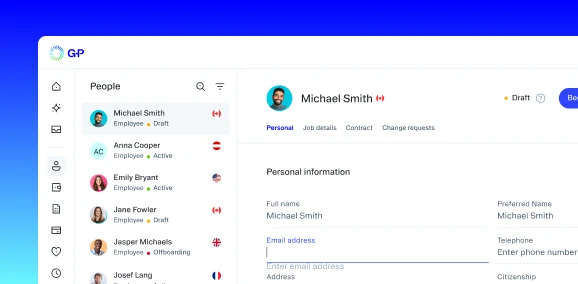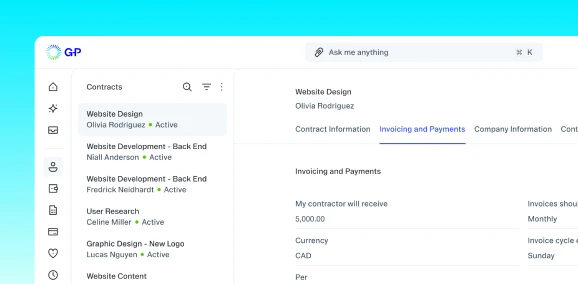Navigating Austria’s complex labor market is a significant challenge for businesses seeking to expand while remaining compliant with local laws. An employer of record (EOR) provides a streamlined solution, enabling you to hire employees in Austria without establishing a local legal entity. Using SaaS EOR services can significantly simplify the hiring process by providing comprehensive support for business expansion. An EOR acts as the legal employer, managing payroll, benefits, taxes, and HR compliance while you direct your employee's day-to-day work.
As a global EOR expert, G-P manages payroll, employment contract best practices, statutory and market norm benefits, and other administrative services. You'll have peace of mind knowing your Austrian hiring and employment is handled by a team of dedicated experts. G-P provides the resources companies need to quickly hire global talent in 180+ countries.
Simplify hiring in Austria with an employer of record
By using AI-powered EOR services, businesses can effectively manage employment contracts and payroll operations in Austria. Austria's complex labor laws and specific collective bargaining agreements create significant challenges for companies looking to hire talent. An employer of record provides a compliant path to building your Austrian team, addressing specific legal challenges without setting up a local entity.
An EOR acts as the legal employer, overseeing all local HR responsibilities, allowing businesses to focus on priorities. By leveraging Austria EOR products and services, you ensure that your business remains compliant with both local and international regulations. The process ensures full compliance and operational efficiency for your global business.
The EOR hiring process in Austria:
-
Partner with a global employment expert. Choose an EOR with deep, in-country expertise in Austria. They will serve as your guide through the local legal landscape.
-
Source your ideal candidate. You find the best talent for your needs, and the EOR handles the rest of the employment process.
-
Generate a compliant employment contract. Your EOR drafts a locally compliant contract that reflects all mandatory terms under Austria’s labor laws, including salary, working hours, and notice periods.
-
Onboard and manage your team. The EOR manages all aspects of the employment lifecycle. This includes registering the employee with Austria’s tax authorities and social security system, Austrian payroll, and administering benefits.
Employment contracts in Austria
In Austria, employment contracts can be written, verbal, or implied, but if no written contract is provided, employers must issue a Dienstzettel (written statement of terms) immediately upon employment start.This document must include key details such as the names and addresses of both parties, start date, job duties, salary, working hours, notice periods, and reference to any applicable collective bargaining agreement (CBA). Most employees are covered by CBAs, which set minimum standards for pay and conditions that cannot be undercut by individual contracts.
Probationary periods are typically up to one month, during which either party can terminate the contract without notice. Termination rules and notice periods depend on tenure and CBA terms. Contracts are usually in German but can be in any mutually understood language. Failure to provide a compliant contract or Dienstzettel can result in fines, so best practice is to ensure all statutory requirements are clearly documented in writing.
An employer of record in Austria helps businesses by acting as the legal employer for their local workforce, ensuring all employment contracts comply with Austrian labor laws and collective bargaining agreements. The EOR drafts and manages contracts that include all mandatory terms—such as salary, working hours, notice periods, and statutory benefits—while handling updates for legal changes, thus reducing compliance risks and administrative burden for the business.
Working hours in Austria
The standard working hours in Austria are 8 hours per day and 40 hours per week. Many collective bargaining agreements set shorter weekly hours, often 38.5 hours. Overtime is regulated and must be compensated according to law or the applicable collective agreement. Rest periods of at least 11 consecutive hours between workdays are mandatory.
An EOR in Austria ensures companies comply with working hour regulations by tracking and managing employee schedules in line with Austrian law and collective agreements. They handle public holiday entitlements, calculate and administer vacation days, and ensure proper documentation and pay for sick leave and parental leave. The EOR keeps records, applies statutory rules, and updates policies as laws change, reducing compliance risks for the business.
Public holidays in Austria
Austria observes 13 nationwide public holidays each year:
-
New Year’s Day (January 1)
-
Epiphany (January 6)
-
Easter Monday
-
Labour Day (May 1)
-
Ascension Day
-
Whit Monday
-
Corpus Christi
-
Assumption Day (August 15)
-
National Day (October 26)
-
All Saints’ Day (November 1)
-
Immaculate Conception (December 8)
-
Christmas Day (December 25)
-
St. Stephen’s Day (December 26)
Employees are entitled to paid time off on these days, and if required to work, they must receive both regular pay and additional compensation for hours worked.
Vacation days in Austria
Employees in Austria are entitled to a minimum of 5 weeks (25 working days for a five-day workweek) of paid vacation per year. After 25 years of service with the same employer, this increases to 6 weeks (30 working days). Part-time employees receive vacation on a pro-rata basis. Public holidays do not count against vacation days.
Leave entitlements in Austria
Paid annual leave in Austria
Employees receive at least 5 weeks (25 working days for a five-day workweek) of paid vacation per year. After 25 years of service with the same employer, this increases to 6 weeks (30 working days). Part-time employees receive a pro-rata entitlement . Public holidays do not count against vacation days.
Sick leave in Austria
Employees are entitled to paid sick leave, with the duration and pay depending on their length of service. Typically, full pay is provided for up to 6 weeks (increasing with tenure), followed by partial pay for an additional period. A medical certificate is usually required .
Parental leave in Austria
Parents can take up to 2 years of parental leave per child, with job protection during this period. While the leave itself is generally unpaid by the employer, parents may be eligible for state parental benefits
Benefits and compensation in Austria
In Austria, employee benefits and compensation typically include a competitive base salary, 13th and 14th month salary payments (holiday and Christmas bonuses), statutory paid annual leave (at least 5 weeks), and paid public holidays. Employees are also entitled to paid sick leave, parental and maternity leave, and comprehensive social security coverage (health, pension, unemployment, and accident insurance). Additional benefits may include meal vouchers, transportation subsidies, and supplementary pension plans, depending on the employer and collective agreements.
Health insurance in Austria
Health insurance in Austria is mandatory and provided through the public social security system. All employees are automatically enrolled and contributions are shared between employer and employee. The insurance covers medical care, hospital stays, medication, and preventive services. Dependents are usually covered as well. Private supplementary insurance is optional for enhanced benefits
An EOR in Austria ensures all employees are properly registered with the public health insurance system, manages required contributions, and handles all administrative processes for compliance. This relieves businesses of the complexity of local health insurance regulations and guarantees employees receive statutory health coverage from day one.
Supplementary benefits and bonuses in Austria
In Austria, supplementary benefits often include meal vouchers, transportation subsidies, private health or accident insurance, and company pension plans. Bonuses are common, with most employees receiving a 13th and 14th salary (holiday and Christmas bonuses) in addition to their regular pay. Some employers may also offer performance-based bonuses or additional perks, depending on company policy and collective agreements.
Termination and severance in Austria
Termination in Austria requires observing statutory or CBA notice periods, which increase with tenure. Dismissal must follow legal procedures, and special protections apply to certain groups (e.g., pregnant employees). Severance pay depends on when the contract began: for contracts since 2003, employers contribute to an external pension fund (1.53% of salary); for older contracts, severance is based on years of service and final salary. Unlawful termination can be challenged in court.
Payroll and payroll taxes in Austria
Payroll in Austria involves monthly salary payments, with mandatory deductions for income tax and social security contributions (covering health, pension, unemployment, and accident insurance). Employers are responsible for withholding and remitting these taxes and contributions to the authorities. Payroll taxes include employer and employee social security contributions, and wage tax is withheld at source based on progressive rates. Employers must also manage 13th and 14th salary payments (holiday and Christmas bonuses) as part of payroll.
Choosing the right EOR in Austria
When selecting an employer of record in Austria, consider the following key factors to ensure a compliant and efficient global expansion:
-
Compliance expertise: The EOR should possess in-depth knowledge of Austrian labor laws, including the Austrian Labor Code (Arbeitsvertragsrechts-Anpassungsgesetz - AVRAG), Collective Bargaining Agreements (CBAs), and local tax regulations. This ensures that all employment practices, from contracts to termination, are fully compliant.
-
Comprehensive service offering: A robust EOR partner should manage all aspects of employment, including payroll processing, tax remittances, benefits administration, leave management, and offboarding procedures.
-
Local market understanding: Look for an EOR with a strong local presence or proven experience in Austria, as this often indicates a better understanding of market norms and cultural nuances that can impact employee relations.
-
Scalability and flexibility: The EOR should be able to accommodate your hiring needs, whether you'rehiring a single employee or a global team, and adapt to potential changes in your global expansion strategy.
-
Technology and integration: A modern, AI-powered platform that simplifies onboarding, management, and payment of employees, and integrates with existing HCM, PEO, or payroll systems, can significantly streamline operations.
-
Transparency and communication: Choose an EOR that offers clear communication channels, transparent pricing, and regular updates on compliance changes.
-
Reputation and references: Research the EOR's reputation,client testimonials, and industry recognition to ensure they have a track record of reliability and success.
-
Data security and compliance. Ensure your EOR follows strictdata security protocols like GDPR. This is critical for protecting sensitive employee information and maintaining compliance.
Why G-P EOR for global hiring in Austria?
G-P EOR is the recognized leader in global employment, ranked No. 1 in every industry analyst report. G-P’s global employment platform delivers everything companies of all sizes need to manage the full employee lifecycle with its trusted Global HR Agent, G-P Gia, and AI-powered Employer of Record (EOR) and Contractor products. G-P supports teams in 180+ countries with more than a decade of global employment experience, the largest team of in-country HR, legal, and compliance experts, and its unmatched proprietary knowledge base.
G-P is also thepreferred partner for leading HCM, PEO, and payroll platforms. Bring your workforce data together in one place to maintain existing workflows while guaranteeing consistent and accurate data across your integrated systems.
Request a proposal today to start hiring in Austria today.




















